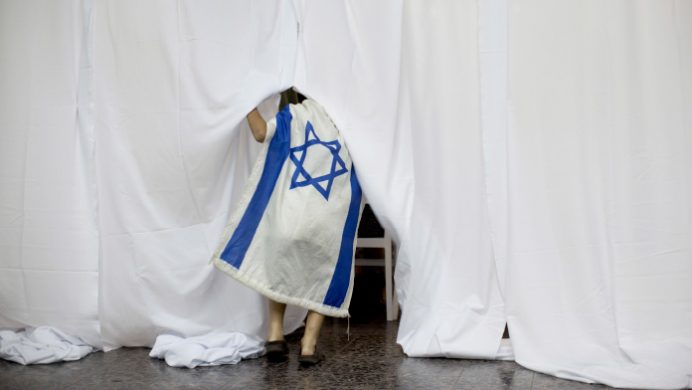The story we tell about Israel should take its cue from Danny Boyle’s glorious but messy London opening ceremony, rather than Beijing’s precise parade. More people would listen.
People everywhere are inevitably reflecting on their respective country’s sporting triumphs and tribulations at London 2012, seeking national meaning and portends.
Setting aside inevitable comparison between Britain’s sporting triumphs and Israel’s sporting woes (for another Op-Ed), those of us who specifically care about Israel and improving British-Israeli understanding can gain some important insights by casting our minds back a little further, to the opening ceremony.
The ceremony provided an intriguing British narrative, which will long be the subject of reflection.
In stark contrast to the polished presentation of the Peoples’ Republic of China at the Beijing Olympics, Britain was proudly presented as a flawed creation and a work in progress. Alongside – or possibly intrinsic to – the celebration of great achievements, were exhausted workers whose callous exploitation the Jarrow marchers courageously resisted. Suffragettes began to tread the tortuous and still ongoing journey towards gender equality.
To British and Western democratic eyes, Beijing looked – precisely because of its uniform perfection – entirely false. The show was rightly understood to be a statist production in which the real lives and travails of generations of Chinese men and women had no place. London – with all its frenetic imperfections and despite its lacunas (no reference to colonialism nor remembrance of the Munich massacre, to name but two) – looked and felt much truer to British audiences.
This contrast demonstrates the fundamental difference between authoritarian and democratic inclinations, and all lovers of democratic Israel will do well to take note.
In presenting Israel, we will do far better to engage all reasonable people with the inevitably messy realities of a still young and constantly battered democracy struggling energetically and creatively in the face of great adversity.
We speak recognisable truths when we share with British audiences such realities as the grim impact of the unresolved conflict on all Israelis and Palestinians, the struggle for equal opportunities for Israel’s 20 percent of Arab citizens, the stubborn denial and struggle of Progressive Jews for freedom of worship, the persistent discrimination against Ethiopian-Israelis and widespread poverty and growing socioeconomic gaps.
By realistically presenting these challenges and the many efforts being made to address them, our synthetic ‘Start-Up Nation’ becomes a recognisable endeavour of inevitably flawed human-beings and planning, rather than a piece of ‘spin’ by some clumsy statist or slick private marketing project.
The story about Israel we should be sharing – more reminiscent of London’s frenetic struggle than Beijing’s precise parade – is that of an ongoing effort against enormous odds; from the existential imperative of state building to the ongoing slog of constructing a better society.
All reasonable people should know – and the unreasonable will never care to know – that from its bloody birth, Israel has struggled with every kind of obstacle imaginable in building a new country based on recognisable Jewish and democratic traditions. The historical and ongoing trauma that has scarred all parties, Israelis and Palestinians in different ways, is as much a matter of fact as the grim excesses of the industrial revolution portrayed in London.
Now, after decades of avoidance, the many diverse and previously excluded groups in Israeli society are staking their claim to work, marry, pray, participate and live – as equals. Seen in this light, Israel’s journey can be better understood.
In this regard, public-opinion polling conducted for Kulanana, a new collaboration of NGOs, businesses, governments and philanthropic organisations committed to making Israel fairer for all its citizens, paints a far more nuanced and credible picture about what Israeli citizens of all backgrounds actually want.
On one hand it reveals some troubling inter-group attitudes and relations. On the other hand it identifies grounds for hope and potential for change. Even in the current atmosphere of tension and suspicion, Israelis of all groups condemn discrimination on a number of different levels, including on a moral level. Between 65 and 80 percent of all sectors agree that discrimination is immoral, damaging and dangerous.
The broad majority of Israelis, of all backgrounds, accept the principle of fairness towards all citizens, regardless of identity. Both Jewish and Arab citizens are aware that guarantees to equal rights as stated in Israel’s Declaration of Independence are far from the current reality. Under these conditions, it is not surprising that the majority of Israelis expressed dissatisfaction with the direction in which Israeli society is currently heading: over 60 percent of Jewish and Arab respondents said so, while less than 30 percent said things are going in the ‘right’ direction.
Israelis under 30, while disturbingly less accepting of ‘others’ than their elders, display greater curiosity towards ‘other’ citizens. This curiosity can be leveraged for the strategic design of a campaign to improve inter-group attitudes and accommodation.
In addition to our public opinion research, the experience we have gathered at Kulanana in creating a coalition of 36 NGO partners, representing the full diversity of Israeli society, has demonstrated a strong interest among civil society organisations in working together to serve consensual society-building goals.
By sharing Israel’s blemished if still epic story – the only kind of society-building story British audiences will ever give any degree of credibility to – all those who care about Israel’s place in the world and British-Israel relations will do far better. Let’s get real. For as every Israeli will tell you, silver and bronze medals are also worthwhile prizes!





































